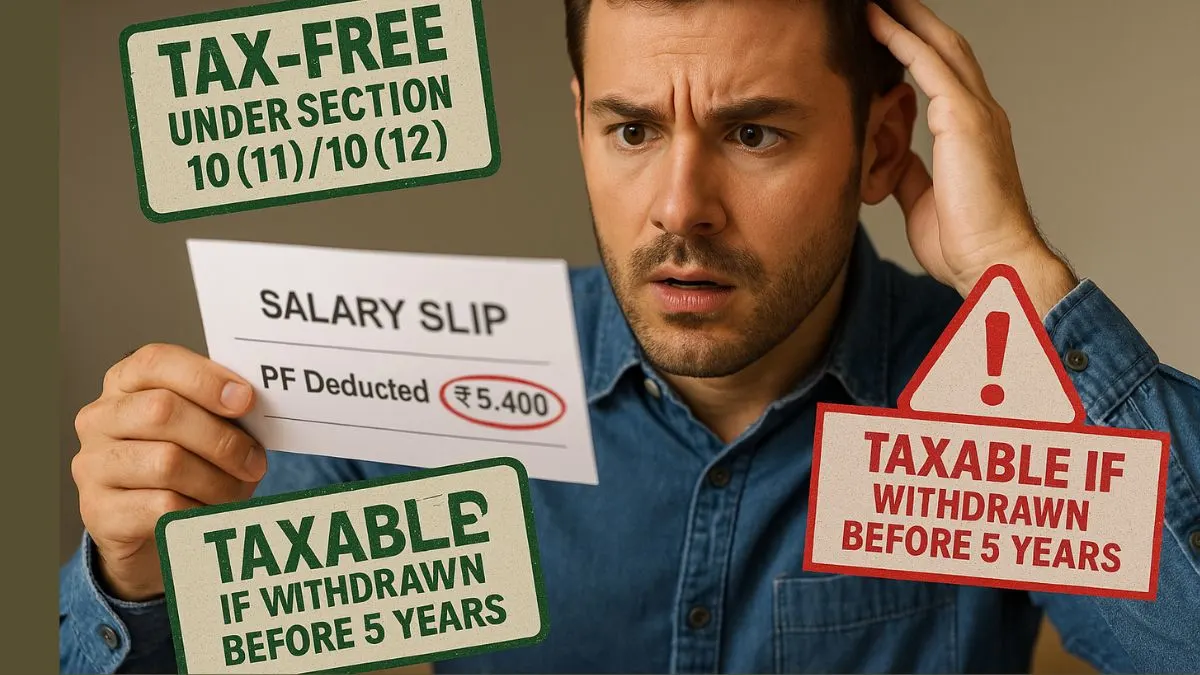
When planning your taxes, one of the safest & most rewarding strategies is investing in a Provident Fund (PF). Not only does it help build your retirement corpus, but it also provides income tax exemptions under specific sections of the Income Tax Act. Let’s break down how & why the Provident Fund exemption from income tax section is beneficial for salaried individuals.
What Is a Provident Fund?
A Provident Fund is a retirement savings scheme where both the employee & employer contribute a portion of the salary. Over time, it builds into a significant fund that you receive upon retirement or resignation.
There are mainly three types:
- Public Provident Fund (PPF)
- Employees’ Provident Fund (EPF)
- General Provident Fund (GPF)
Each of these schemes enjoys different tax exemptions, but the underlying principle is the same: tax-saving wealth-building.
Relevant Income Tax Sections That Offer Exemption
Here’s where the Income Tax Act helps you save money legally:
- Section 10(11) – Interest earned from Statutory Provident Fund (SPF) & Public Provident Fund (PPF) is exempt from tax.
- Section 10(12) – The amount received from a Recognised Provident Fund at the time of retirement is exempt from tax.
- Rule 8 of Part A of the Fourth Schedule – Limits tax-free employer contribution up to 12% of salary.
- Section 80C – Allows deduction for your contribution to PF (up to ₹1.5 lakh).
Let’s dig deeper into these & what they mean for you.
Employer’s Contribution – Exempt but With a Limit
Employer’s contribution to your EPF account is exempt from tax only if it does not exceed 12% of your salary (basic DA). Any amount above this is taxable under the head “Income from Salary.”
This provision ensures that your employer can support your future without adding to your tax burden, up to a fair threshold.
Employee’s Contribution – Claim Under 80C
Your contribution — usually 12% of your salary — qualifies for tax deduction under Section 80C, up to ₹1.5 lakh in a financial year.
This is the most common deduction claimed by salaried individuals.
Tax-Free Interest and Withdrawals
Here’s some good news. The interest & final income tax on PF withdrawal are tax-free, but only under certain conditions:
- You’ve completed 5 years of continuous service.
- The PF withdrawal is due to retirement, health issues, or employer shutdown.
If these conditions are met, the amount received from a provident fund is exempt from tax entirely. "
What Happens If You Withdraw Early?
If you withdraw PF before 5 years, the accumulated interest becomes taxable, & previous 80C deductions may be reversed. So, unless it’s an emergency, it’s better to keep your PF intact until maturity.
Provident Fund in the New Tax Regime
Under the new tax regime, employer contributions & interest still enjoy some tax benefits, but you cannot claim deductions under Section 80C. So, while the provident fund exemption from income tax section still applies in some form, it’s limited in scope.
Tax on High-Value Provident Fund Accounts
As of FY 2021–22, interest earned on employee contributions exceeding ₹2.5 lakh per annum is taxable. For government employees (with no employer contribution), the threshold is ₹5 lakh. This prevents high earners from parking excess funds just for tax-free growth.
How to Claim Provident Fund Exemption?
You don’t need to file a separate form. Just ensure:
- You mention your 80C contribution in your ITR.
- Your employer correctly reflects the EPF breakup in Form 16.
- You don’t withdraw PF early unless necessary.
Also, ensure your PAN is linked to your EPF account, or TDS will be higher in case of withdrawals. "
Quick Recap
|
Feature |
Tax Treatment |
|
Employee’s Contribution |
Deduction under 80C (up to ₹1.5 lakh) |
|
Employer’s Contribution |
Exempt up to 12% of salary |
|
Interest Earned |
Tax-free up to ₹2.5L/year contribution |
|
Withdrawal After 5 Years |
Fully Exempt |
|
Withdrawal Before 5 Years |
Fully Taxable |
Final Thoughts
Whether it’s the employees' provident fund exemption from income tax section, or the public provident fund exemption from income tax section, the law intends to promote disciplined saving & financial security for retirement. If used wisely, this can be one of your most effective tax-saving tools.
Still confused about how to show PF exemption in your ITR? Let the experts handle it — Book your Tax Filing with Callmyca.com & file your return stress-free!











